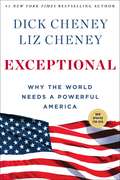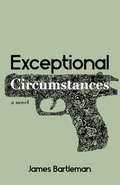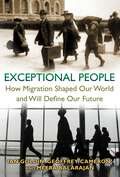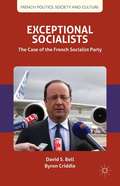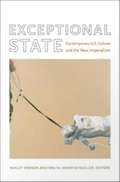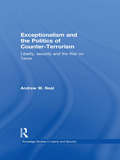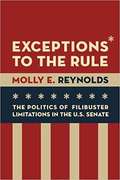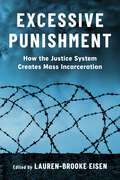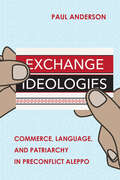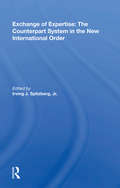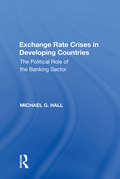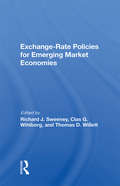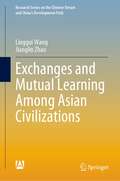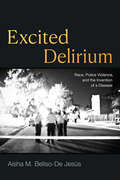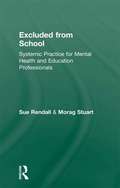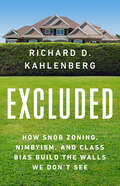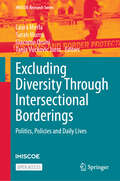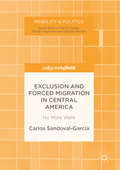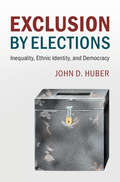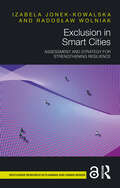- Table View
- List View
Exceptional
by Dick Cheney Liz CheneyA new book by former Vice President and #1 New York Times bestselling author Dick Cheney and Liz Cheney.
Exceptional Circumstances
by James BartlemanAutumn, 1970: Hostage-taking separatists in Quebec abduct a foreign diplomat and a cabinet minister and threaten violence across the country. As fear sets in, the government turns to Luc Cadotte, a specialist on international terrorism and veteran of the clandestine struggles in Latin America. From the jungles of Colombia to Montreal under siege, former diplomat James Bartleman plots a turbulent thriller based on events he witnessed first-hand. Swerving between fanatical ideologues and crass careerists with bloody hands, Cadotte has to choose sides when they all seem dirty, and put everything on the line in a crisis that puts all that he stands for to the test.
Exceptional People: How Migration Shaped Our World and Will Define Our Future
by Ian Goldin Geoffrey Cameron Meera BalarajanThe past, present, and future role of global migrationThroughout history, migrants have fueled the engine of human progress. Their movement has sparked innovation, spread ideas, relieved poverty, and laid the foundations for a global economy. In a world more interconnected than ever before, the number of people with the means and motivation to migrate will only increase. Exceptional People provides a long-term and global perspective on the implications and policy options for societies the world over. Challenging the received wisdom that a dramatic growth in migration is undesirable, the book proposes new approaches for governance that will embrace this international mobility.The authors explore the critical role of human migration since humans first departed Africa some fifty thousand years ago—how the circulation of ideas and technologies has benefited communities and how the movement of people across oceans and continents has fueled economies. They show that migrants in today's world connect markets, fill labor gaps, and enrich social diversity. Migration also allows individuals to escape destitution, human rights abuses, and repressive regimes. However, the authors indicate that most current migration policies are based on misconceptions and fears about migration's long-term contributions and social dynamics. Future policies, for good or ill, will dramatically determine whether societies can effectively reap migration's opportunities while managing the risks of the twenty-first century.A guide to vigorous debate and action, Exceptional People charts the past and present of international migration and makes practical recommendations that will allow everyone to benefit from its unstoppable future growth.
Exceptional Socialists
by David S. Bell Byron CriddleThis engaging exploration of the French Socialist Party details the exceptional problems that the party has faced and the way it has dealt with them. The result is a comprehensive and compelling guide to the quiddities of political infighting, the structure of power and of the environment in which the party operates.
Exceptional State: Contemporary U.S. Culture and the New Imperialism
by Ashley Dawson Malini Johar SchuellerExceptional State analyzes the nexus of culture and contemporary manifestations of U. S. imperialism. The contributors, established and emerging cultural studies scholars, define culture broadly to include a range of media, literature, and political discourse. They do not posit September 11, 2001 as the beginning of U. S. belligerence and authoritarianism at home and abroad, but they do provide context for understanding U. S. responses to and uses of that event. Taken together, the essays stress both the continuities and discontinuities embodied in a present-day U. S. imperialism constituted through expressions of millennialism, exceptionalism, technological might, and visions of world dominance. The contributors address a range of topics, paying particular attention to the dynamics of gender and race. Their essays include a surprising reading of the ostensibly liberal movies Wag the Dog and Three Kings, an exploration of the rhetoric surrounding the plan to remake the military into a high-tech force less dependent on human bodies, a look at the significance of the popular Left Behind series of novels, and an interpretation of the Abu Ghraib prison photos. They scrutinize the national narrative created to justify the U. S. invasions of Afghanistan and Iraq, the ways that women in those countries have responded to the invasions, the contradictions underlying calls for U. S. humanitarian interventions, and the role of Africa in the U. S. imperial imagination. The volume concludes on a hopeful note, with a look at an emerging anti-imperialist public sphere. Contributors. Omar Dahbour, Ashley Dawson, Cynthia Enloe, Melani McAlister, Christian Parenti, Donald E. Pease, John Carlos Rowe, Malini Johar Schueller, Harilaos Stecopoulos
Exceptionalism and Industrialisation
by Leandro Prados de la EscosuraThis 2004 book explores the question of British exceptionalism in the period from the Glorious Revolution to the Congress of Vienna. Leading historians examine why Great Britain emerged from years of sustained competition with its European rivals in a discernible position of hegemony in the domains of naval power, empire, global commerce, agricultural efficiency, industrial production, fiscal capacity and advanced technology. They deal with Britain's unique path to industrial revolution and distinguish four themes on the interactions between its emergence as a great power and as the first industrial nation. First, they highlight growth and industrial change, the interconnections between agriculture, foreign trade and industrialisation. Second, they examine technological change and, especially, Britain's unusual inventiveness. Third, they study her institutions and their role in facilitating economic growth. Fourth and finally, they explore British military and naval supremacy, showing how this was achieved and how it contributed to Britain's economic supremacy.
Exceptionalism and the Politics of Counter-Terrorism: Liberty, Security and the War on Terror (Routledge Studies in Liberty and Security)
by Andrew W. NealThis book is an analysis and critique of the concepts of ‘exception’ and ‘exceptionalism’ in the context of the politics of liberty and security in the so-called ‘War on Terror’. Since the destruction of the World Trade Centre on September 11th 2001, a notable transformation has occurred in political discourse and practice. Politicians and commentators have frequently made the argument that the rules of the game have changed, that this is a new kind of war, and that exceptional times require exceptional measures. Under this discourse of exceptionalism, an array of measures have been put into practice, such as detention without trial, ‘extraordinary rendition’, derogations from human rights law, sanction or connivance in torture, the curtailment of civil liberties, and aggressive war against international law. Situating exceptionalism within the post-9/11 controversy about the relationship between liberty and security, this book argues that the problem of exceptionalism emerges from the limits and paradoxes of liberal democracy itself. It is a commentary and critique of both contemporary practices of exceptionalism and the critical debate that has formed in response. Through a detailed assessment of the key theoretical contributions to the debate, this book develops exceptionalism as a critical tool. It also engages with the problem of exceptionalism as a discursive claim, as a strategy, as a concept, as a theoretical problem and as a practice. This is the first book to capture the importance of the exceptionalism debate in a single volume, and will be of much interest to students of critical security studies, political philosophy, IR theory and sociology.
Exceptions to the Rule: The Politics of Filibuster Limitations in the U. S. Senate
by Molly E. ReynoldsSpecial rules enable the Senate to act despite the filibuster. Sometimes. <P><P> Most people believe that, in today's partisan environment, the filibuster prevents the Senate from acting on all but the least controversial matters. But this is not exactly correct. In fact, the Senate since the 1970s has created a series of special rules—described by Molly Reynolds as “majoritarian exceptions”—that limit debate on a wide range of measures on the Senate floor. <P><P> The details of these exemptions might sound arcane and technical, but in practice they have enabled the Senate to act even when it otherwise seemed paralyzed. Important examples include procedures used to pass the annual congressional budget resolution, enact budget reconciliation bills, review proposals to close military bases, attempt to prevent arms sales, ratify trade agreements, and reconsider regulations promulgated by the executive branch. <P><P> Reynolds argues that these procedures represent a key instrument of majority party power in the Senate. They allow the majority—even if it does not have the sixty votes needed to block a filibuster—to produce policies that will improve its future electoral prospects, and thus increase the chances it remains the majority party. <P><P> As a case study, Exceptions to the Rule examines the Senate's role in the budget reconciliation process, in which particular congressional committees are charged with developing procedurally protected proposals to alter certain federal programs in their jurisdictions. Created as a way of helping Congress work through tricky budget issues, the reconciliation process has become a powerful tool for the majority party to bypass the minority and adopt policy changes in hopes that it will benefit in the next election cycle.
Excessive Punishment: How the Justice System Creates Mass Incarceration
by Lauren-Brooke EisenThe United States has by far the world’s largest population of incarcerated people. More than a million Americans are imprisoned; hundreds of thousands more are held in jails. This vast system has doled out punishment—particularly to people from marginalized groups—on an unfathomable scale. At the same time, it has manifestly failed to secure public safety, instead perpetuating inequalities and recidivism. Why does the United States see punishment as the main response to social harm, and what are the alternatives?This book brings together essays by scholars, practitioners, activists, and writers, including incarcerated and formerly incarcerated people, to explore the harms of this punitive approach. The chapters address a range of issues, from policing to prosecution, and from how people are treated in prison to the consequences of a criminal conviction. Together, they consider a common theme: We cannot reduce our dependence on mass incarceration until we confront our impulse to punish in ways that are excessive, often wildly disproportionate to the harm caused. Essays trace how a maze of local, state, and federal agencies have contributed to mass incarceration and deterred attempts at reform. They shed light on how the excesses of America’s criminal legal system are entwined with poverty, racism, and the legacy of slavery. A wide-ranging and powerful look at the failures of the status quo, Excessive Punishment also considers how to reimagine the justice system to support restoration instead of retribution.
Exchange Ideologies: Commerce, Language, and Patriarchy in Preconflict Aleppo
by Paul AndersonExchange Ideologies documents the social world of Aleppo's traders before the destruction of the city, exploring changing conceptions of commerce in Syria. Syria's traders have been seen as embodying a timeless culture of "the bazaar," or an ahistorical Islamic culture of trade. Other accounts portray them as venal figures, motivated only by profit, and commerce as a purely instrumental pursuit. Rejecting both approaches, Paul Anderson traces the diverse social structures, and notions of language, through which Aleppo's merchants understood and construed commerce and the figure of the merchant during a period of economic liberalization in the 2000s. Rather than seeing these social structures and representations as expressions of a timeless bazaar culture, or as shaped only by Islamic tradition, Exchange Ideologies relates them to processes of politically managed economic liberalization and the Syrian regime's attempts to ensure its own survival in the midst of change. In doing so, Anderson provides an account of economic liberalization in Syria as a social and cultural process as much as a political and economic one.
Exchange Of Expertise/h: The Counterpart System In The New International Order
by Irving J. SpitzbergThe vision of the New International Order emphasizes justice and equality. It also raises profound questions about the nature and future of the relationship between postindustrial and Third World countries. The counterpart system describes one aspect of this relationship: an expert from a postindustrial country teaches a special skill to a Third World national. In this collection contributors draw on political science, economics, education, sociology, history, and communications theory to illuminate the forces that shape the nature of the exchange of expertise between postindustrial and Third World countries. Each author raises theoretical points and offers practical observations about the future of this exchange—a critical point of contact--in the New International Order.
Exchange Rate Alignments
by John MillsThis book calls for a radical reappraisal of economic policy in the UK. It argues that a much lower exchange rate is needed to re-establish sufficient manufacturing capacity to enable Britain to pay its way in the world. Mills makes the case for the removal of balance of payments constraints to achieve growth and avoid endless austerity.
Exchange Rate Assessment in a Resource-Dependent Economy: The Case of Botswana
by Matthew Gaertner Corinne DeléchatA report from the International Monetary Fund.
Exchange Rate Crises in Developing Countries: The Political Role of the Banking Sector (The\international Political Economy Of New Regionalisms Ser.)
by Michael G. HallAccording to many economists, the increasing mobility of capital across borders has made it more costly to peg exchange rates. This phenomenon has contributed to some of the more famous examples of exchange rate crises in recent times, such as the Mexican peso crisis in 1994 and the Asian financial crisis in 1997. Yet despite the increasing costs of pegging in today's accelerated financial markets, some developing countries try to maintain a peg for as long as they can. This work is the first to theorize the role of bankers as a domestic interest group involved in exchange rate policy. It adds to our understanding of how interest groups affect economic policy in developing countries and explains why some of the largest and fastest growing economies in the developing world were the most prone to crisis. The volume also refines our understanding of the 'hollowing-out thesis', the argument that increasing capital mobility is forcing states to abandon pegging.
Exchange Rate Regimes in an Increasingly Integrated World Economy
by Paul Masson Michael Mussa Alexander Swoboda Esteban Jadresic Paolo Mauro Andrew BergThis paper builds upon previous International Monetary Fund (IMF) studies on various aspects of the exchange rate arrangements of IMF member countries consistent with the IMF's role of surveillance of members' exchange rate policies and over the international monetary system. The paper examines the consequences of increased capital mobility and of the integration of developing economies in globalised goods and financial markets for the exchange rate regimes both of the world's major currencies and of developing and transition countries.
Exchange-Rate Policies For Emerging Market Economies (Political Economy Of Global Interdependence Ser.)
by Richard J SweeneyWith the loss of Soviet control in Central and Eastern Europe, as well as the move toward economic liberalization in many developing countries, a huge increase in the number of convertible currencies in the world has occurred. A key aspect of the management of these currencies involves their relationships with the world economy, which is determined
Exchanges and Mutual Learning Among Asian Civilizations (Research Series on the Chinese Dream and China’s Development Path)
by Jianglin Zhao Linggui WangThis book consists of global scholars’ views on mankind’s wishes for the future, the Belt and Road Initiative, bilateral cooperation, inter-civilization exchanges, and mutual learning among Asian civilizations, which represent a critical way to boost the construction of an Asian community with a shared future and a community with a shared future for mankind. It also gives some insight into the future development of Asian civilizations. The book aims to present a diverse and balanced overview on the prospect of Asian development.
Excited Delirium: Race, Police Violence, and the Invention of a Disease
by Aisha M. Beliso-De JesúsIn 1980, Charles Wetli---a Miami-based medical examiner and self-proclaimed “cult expert” of Afro-Caribbean religions---identified what he called “excited delirium syndrome.” Soon, medical examiners began using the syndrome regularly to describe the deaths of Black men and women during interactions with police. Police and medical examiners claimed that Black people with so-called excited delirium exhibited superhuman strength induced from narcotics abuse. It was fatal heart failure that killed them, examiners said, not forceful police restraints. In Excited Delirium, Aisha M. Beliso-De Jesús examines this fabricated medical diagnosis and its use to justify and erase police violence against Black and Brown communities. Exposing excited delirium syndrome’s flawed diagnostic criteria, she outlines its inextricable ties to the criminalization of Afro-Latiné religions. Beliso-De Jesús demonstrates that it is yet a further example of the systemic racism that pervades law enforcement in which the culpability for state violence is shifted from the state onto its victims. In so doing, she furthers understanding of the complex layers of medicalized state-sanctioned violence against people of color in the United States.
Exciting Times: Longlisted for the Women's Prize for Fiction 2021
by Naoise Dolan'The book of the summer ... Kept me rapt until the final page' THE TIMES'A sharp, smart, witty modern love story. I loved it' David Nicholls, author of ONE DAY'More than lives up to the hype ... Likely to fill the Sally-Rooney-shaped hole in many readers' lives' IRISH TIMES'Droll, shrewd and unafraid - a winning debut' Hilary Mantel, author of WOLF HALL'I've been pushing Exciting Times on everyone I know. Some of Dolan's pithy observations of her characters are the best I've read since Edward St Aubyn' OBSERVER'A frankly sensational book' Pandora Sykes on THE HIGH LOW'In the tradition of Dorothy Parker, Joan Rivers and Nora Ephron ... I found myself purring with pleasure. ...This is comic writing at the highest level' Craig Brown, DAILY MAILWhen you leave Ireland aged 22 to spend your parents' money, it's called a gap year. When Ava leaves Ireland aged 22 to make her own money, she's not sure what to call it, but it involves:- a badly-paid job in Hong Kong, teaching English grammar to rich children;- Julian, who likes to spend money on Ava and lets her move into his guest room;- Edith, who Ava meets while Julian is out of town and actually listens to her when she talks;- money, love, cynicism, unspoken feelings and unlikely connections.Exciting times ensue.
Excluded From School: Systemic Practice for Mental Health and Education Professionals
by Morag Stuart Sue RendallExcluded From School exposes the reasons why, despite many national and local initiatives, large numbers of children continue to tax the education system to such a degree that they become permanently excluded from school. Sue Rendall and Morag Stuart draw on their experience in psychology and education to demonstrate the need for a more thorough exploration of the underlying root causes of the problem. Based on a systemic framework, their approach allows the inclusion of a vast range of possible contributory factors: within the child, within the family, within the school, and within the complex interrelations between these three systems. By demonstrating the need for inter-discipline and inter-agency collaboration, the authors succeed in presenting a persuasive challenge to the blame culture which exists between schools, parents and educational professionals and policymakers in relation to school exclusion. The original research presented here, along with the inclusion of the experiences of children, parents and teachers, provides a valuable new perspective on the problem of school exclusions that will be welcomed by all professionals working in this field.
Excluded: How Snob Zoning, NIMBYism, and Class Bias Build the Walls We Don't See
by Richard D KahlenbergAn indictment of America's housing policy that reveals the social engineering underlying our segregation by economic class, the social and political fallout that result, and what we can do about it The last, acceptable form of prejudice in America is based on class and executed through state-sponsored economic discrimination, which is hard to see because it is much more subtle than raw racism. While the American meritocracy officially denounces prejudice based on race and gender, it has spawned a new form of bias against those with less education and income. Millions of working-class Americans have their opportunity blocked by exclusionary snob zoning. These government policies make housing unaffordable, frustrate the goals of the civil rights movement, and lock in inequality in our urban and suburban landscapes. Through moving accounts of families excluded from economic and social opportunity as they are hemmed in through &“new redlining&” that limits the type of housing that can be built, Richard Kahlenberg vividly illustrates why America has a housing crisis. He also illustrates why economic segregation matters since where you live affects access to transportation, employment opportunities, decent health care, and good schools. He shows that housing choice has been socially engineered to the benefit of the affluent, and, that astonishingly the most restrictive zoning is found in politically liberal cities where racial views are more progressive. Despite this there is hope. Kahlenberg tells the inspiring stories of growing number of local and national movements working to tear down the walls that inflicts so much damage on the lives of millions of Americans.
Excluding Diversity Through Intersectional Borderings: Politics, Policies and Daily Lives (IMISCOE Research Series)
by Laura Merla Sarah Murru Giacomo Orsini Tanja Vuckovic JurosThis open access book critically examines how discourses and policies target and exclude migrants and their families in Europe and North America along racial, gender and sexuality lines, and how these exclusions are experienced and resisted. Building on the influential notion of intersectional borderings, it delves deep into how these discourses converge and diverge, highlighting the underlying normative constructs of family, gender, and sexuality. First, it examines how radical-right and conservative political movements perpetuate exclusionary practices and how they become institutionalized in migration, welfare, and family policies. Second, it examines the dynamic responses they provoke—both resistance and reinforcement—among those affected in their everyday lives. Bringing together studies from political and social sciences, it offers a vital contribution to the expanding field of migrant family governance and exclusion and is essential for understanding the complex processes of exclusion and the movements that challenge and sustain them. It expands academic discussions on populism and the politics of exclusion by linking them to the politicization of intimacy and family life. With diverse case studies from Europe, North, and Central America, it appeals to students, academics, and policymakers, informing future mobilizations against discriminatory and exclusionary tendencies in politics and society.
Exclusion and Forced Migration in Central America: No More Walls (Mobility & Politics)
by Carlos Sandoval-GarcíaThis book marks a critical contribution to the intercultural dialogue about immigration. Each year, thousands of Central Americans leave their countries and walk across Mexico, seeking to reach the United States. The author explores the dispossession process that drives these migrants from their homes and argues that they are caught in a kind of trap: forced to emigrate, but impeded to immigrate. This trap is discussed empirically through the analysis of immigration policies implemented by the United States government and ethnographic fieldwork carried out in some of “albergues” (shelters).
Exclusion by Elections
by John D. HuberExclusion by Elections develops a theory about the circumstances under which 'class identities' as opposed to 'ethnic identities' become salient in democratic politics, and links this theory to issues of inequality and the propensity of governments to address it. The book argues that in societies with even modest levels of ethnic diversity, inequality invites ethnic politics, and ethnic politics results in less redistribution than class politics. Thus, contrary to existing workhorse models in social science, where democracies are expected to respond to inequality by increasing redistribution, the argument here is that inequality interacts with ethnic diversity to discourage redistribution. As a result, inequality often becomes reinforced by inequality itself. The author explores the argument empirically by examining cross-national patterns of voting behaviour, redistribution and democratic transitions, and he discusses the argument's implications for identifying strategies that can be used to address rising inequality in the world today.
Exclusion in Smart Cities: Assessment and Strategy for Strengthening Resilience (Routledge Research in Planning and Urban Design)
by Izabela Jonek-Kowalska Radosław WolniakSmart Cities are fascinating, but they also have a dark side that little is said or written about. One issue is the possibility of generating various types of exclusion. For this reason, this book will develop principles for assessing the inclusiveness of Smart Cities and outline strategies for strengthening urban resistance to exclusion.The book will consider the essence, scale and types of exclusion and include analysis of inclusiveness in practice in the assessment and activities of Smart Cities. The research assesses Smart City literature, with particular emphasis on criticism of the Smart City concept and exclusion generated in smart urban structures, critically analyses the principles and indicators used in international inclusive Smart City rankings, highlights case studies on best practices for preventing exclusions in Smart Cities, and uses trend analysis to assess the scale and intensity of exclusion threats.This book can be used as a compendium of knowledge about exclusions in Smart Cities by both researchers and students, as well as all urban stakeholders, in particular city decision-makers.
